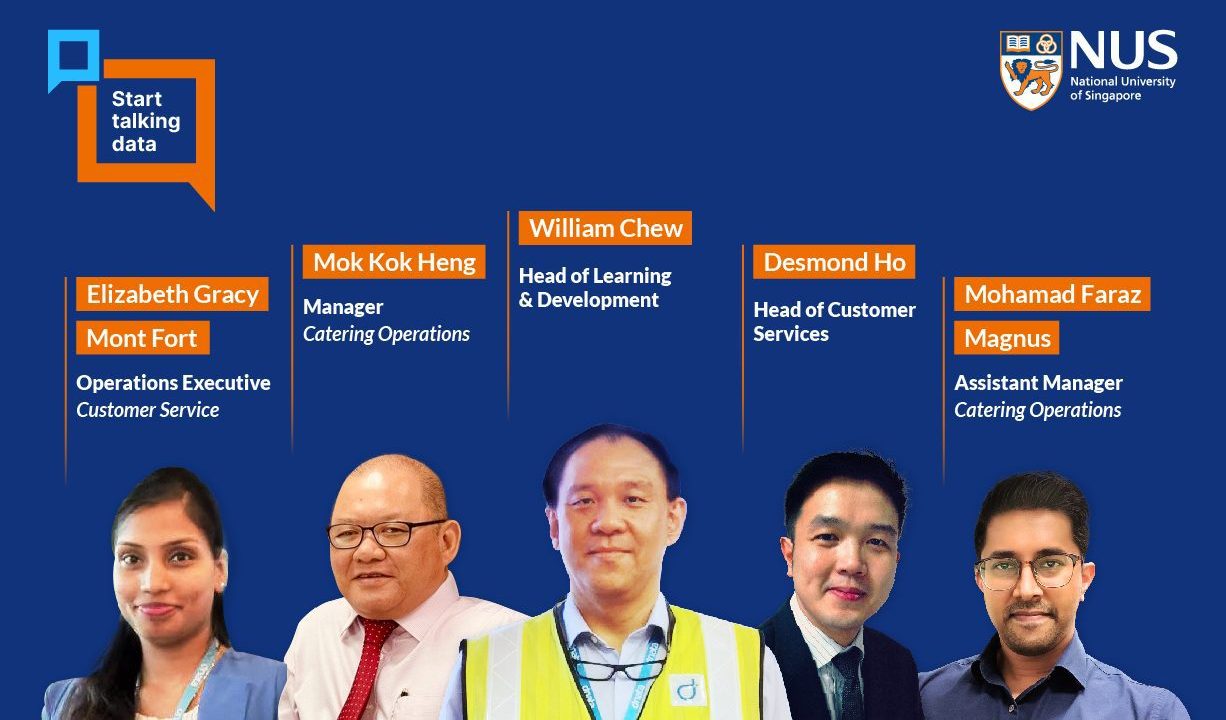With newfound insights from NUS’ data analytics course, these logistics professionals in the hard-hit aviation sector are braced for clearer skies ahead.
6 July 2021 — Covid-19 related travel restrictions crippled the aviation sector; logistics companies have been hard hit. Air services provider dnata Singapore was no exception.
In this sobering climate, William Chew, Head of Learning and Development at dnata, looked for opportunities to boost his colleagues’ morale, including helping them to upskill during the downturn.
“The question is how can we keep people in the organisation engaged while keeping their hopes up? How do we use this downtime to improve their knowledge, competency and skills?” he asked. The pandemic, he said, provided an impetus to boost the company’s digitalisation efforts. This prompted dnata to tap into the Enhanced Training Support Package (ETSP) to fund professional skills courses to help with employee retention.
Chew considered a concise course that would “spark interest in self-directed learning”. In view of trends in the aviation industry and with help from his fellow department heads, he settled on – amongst others – the National University of Singapore’s (NUS) range of data analytics courses.
With increasingly sophisticated capabilities in mind, NUS’ data analytics courses, which introduce participants to data visualisation, interpretation and prediction skills, were a good fit. Chew revealed that they chose NUS’ programme because of its robust academic credentials.
Upskill, stay agile
Among those who have benefitted from the course is Mohamad Faraz Magnus, an assistant manager in dnata Singapore’s catering division. As someone involved in rigorous back-end operations, data management is an integral part of his job.
“Data to us is information, without which we are unable to make projections, have oversight of the things required, or even prevent problems. I deal with data on a daily basis for planning and forecasting operational performance,” he said.
Faraz chose Data Analytics Begins with Me, as he experienced difficulty parsing large volumes of data into useful information. Taught via a Python-based graphical user interface drag-and-drop tool, the course is designed to help professionals who do not have coding skills participate in organisational analytics processes.
“The Orange system helped me to look at large volumes of data in a more simplified and structured manner, by processing it using a specific system,” he said. This, in turn, has given him keen management insights.
Faraz has made quick work of putting his newfound skills to use. He has taken the helm of a new project to boost cost efficiency. This involved analysing multiple streams of data to reduce wastage at dnata, starting from their warehouse operations.
Since the pandemic grounded the airline industry, Faraz’s department – which typically provides meals to carriers such as Lufthansa and Swissair – has branched out to catering to dormitories and taken on other government contracts. Mok Kok Heng, who manages dnata’s catering operations, asserted that staying agile is crucial, and part of that involves attaining new skills, like Faraz did.
“You must adapt to any situation to keep things going (despite tough times). Always upskill and learn the new trade. With Covid-19, it’s obvious that the world is evolving. There will be a new normal, and your working patterns will be different,” the industry veteran said.
Explore new paradigms
Another dnata employee who has broadened her capabilities during the downturn is Elizabeth Gracy Mont Fort. The operations executive in the customer service department attended NUS’ Data-Driven Customer Experience course.
While her department typically conducts internal audits and documents their performance via Excel sheets, she has since learnt to use more incisive analytics tools such as Orange and Tableau.
“This course actually matches dnata’s value of being performance-driven, as we can provide accountability that our data has been measured,” she said, adding that the knowledge she has gained helped convey a clearer picture of the customer experience.
The latter is something that Desmond Ho, dnata’s Head of Customer Services is deeply invested in. “How do you define the right customer experience five, or ten years, from now? Is there a human at the counter or is everything done by a robot? For me, it’s about how data, artificial intelligence, technology and humans can complement one another,” he said.
Ho said that Mont Fort has translated her new skills into creating a more streamlined data system to make better decisions. For instance, she harnessed data to fine-tune the scheduling of mandated training sessions, to optimise compliance.
But more importantly, he saw data analytics competency as a vehicle for rethinking established processes. “The course has inspired her to not just focus on day-to-day operations, but also explore new ideas, how to better the business process.” he said.
Uncertainty aside, Covid-19 may have presented these professionals with a new beginning, armed with new capabilities to build resilience and further professional growth. “We know you’re not going to come back from a one-day data analytics course a data scientist. But it is important that our employees now realise that data is something they can actually work with,” Chew said.

 Register
Register Login
Login


